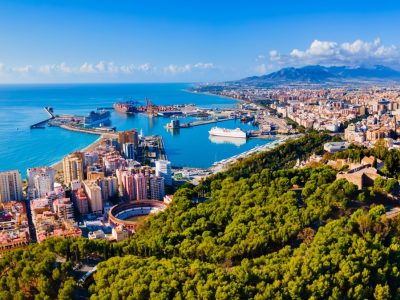Issy McDermott used to go on holidays to drink: she did schoolies, partied her way through Central America, Europe and Asia, and “worked at a party hostel in Indonesia where I drank every day for an entire month”. But over the past year, she has experienced a shift.
The 23-year-old Sydneysider, who also leads group tours with Plotpackers, a UK-based company marketing more affordable trips to young social media creators, became tired of the party life and wanted to travel “to experience the culture and adventure, rather than drinking” when she goes on holiday. She went to India in February and didn’t drink at all, even when she ventured out with large groups of fellow travellers.
McDermott is one of many gen Zs – those born between 1997 and 2012 – who are choosing to drink less, including when they travel.
Dr Amy Pennay, the deputy director of the Centre for Alcohol Policy Research at La Trobe University, has been studying “fundamental changes” in young people’s drinking patterns for 10 years. She believes the decline in gen Z drinking is because “they are more cautious and risk averse”.
“They are worried about their futures and economic security, they are more disciplined and surveilled by parents and on social media, they are more health-conscious, they are anxious, and mental health problems are increasing for young people.”
Drinking isn’t seen as “cool” as it once was, Pennay adds. This trend, she says, is playing out globally, “at least in high-income countries” – in line with the decrease in other risky activities including drug use, truancy and crime.
Student Universe, a discount flight and travel business, has noticed “a significant uptick in young people wanting to avoid alcohol on holiday”, says brand manager Will Jones. The company conducted a study of 1,000 gen Z Australians that showed 84% would take a holiday without drinking. Safety (62%), money (57%) and a desire to not feel unwell and affect the next day’s activities (56%) were the strongest deterrents.
A sober experience
With gen Z’s travel priorities shifting, travel companies that target the demographic have been forced to shift too. Contiki has upped its focus on wellness and sustainability experiences after its research also revealed that most gen Zs (77%) would consider an alcohol-free trip.
“The most common question I’m asked is ‘how is travel changing?’ and we have certainly seen a shift in how gen Z are travelling,” says Toni Ambler, the managing director of Contiki. “Gen Z travellers value experiences over big nights out.”
Ambler references the hikes, safaris, food tours, cold plunges and cultural experiences included on Contiki tours. She says more than 80% of tours include a “make travel matter experience” focused on sustainability. For example, on Contiki tours through India, travellers visit the Dhonk centre, a social enterprise making and selling local crafts, while in Canada, Cree knowledge keepers teach about plant medicine in Jasper national park.
Contiki recently added a South Korean tour featuring a K-pop dance class. A the Philippines tour announced this year “was introduced to satiate the appetite of young travellers looking to visit more remote locations in a safe but authentic way”, Ambler says.
Boutique disrupters are also reimagining the group tour. Australian author Bri Lee takes small groups on trips through Morocco, Egypt and Turkey through Aweventurer, a company that aims to “create experiences as if it is your first and last trip”. On these tours, attenders connect over reading and writing, instead of over drinking.
Emma Dower, a 28-year-old teacher from Donnybrook in Victoria, went on the Turkey trip led by Lee because she wanted to travel with “like-minded people”.
“We visited ancient ruins and ballooned over the mountains of Cappadocia, but the true highlight was the meaningful and intellectual discussion with my peers,” Dower says.
Other Aweventurer trip leaders include influencer and Tammy Fit founder Tammy Hembrow as well as artist and author Reyna Noriega, who market their trips to their legions of young, mostly female followers.
after newsletter promotion
‘I had the shock of my life’
Amid a cost-of-living crisis, young backpackers coming to Australia are also noticing a move away from drinking. Lauren Frater, 20, who is in Sydney on a working holiday visa from the UK, says back home she was working 60 to 70 hours a week across two minimum-wage jobs and “drank excessively after and in between work”. She says “initially, yes, I was attracted to Australia for the backpacker party scene”, but soon realised it would be hard to keep up.
“I had the shock of my life when I discovered just how expensive it is to drink out here,” Frater says. “After a full-on party week in Sydney and realising how much money I had spent, I was quite disappointed as I had now knocked off almost a week of travel from my itinerary based on how much I had spent drinking and partying.
“I kind of had the realisation that if I wanted to do this trip, I really needed to make some lifestyle changes.”
The backpacker drinking scene hasn’t been extinguished, however. Bella Robben, a 20-year-old American residing in Melbourne, who has spent the past two years backpacking across the world, says: “I know just how big the drinking culture is within it [backpacking].”
She enjoys meeting new people when she travels, and drinking can help with that, but she says it “definitely takes its toll emotionally, mentally, financially and physically”.
“How much I drink also depends on the culture and attitude of the location. For example, when I travelled to Barcelona, it was essential to experience the nightlife whereas when I visited Morocco, although we tried a couple of the local beers, drinking as a whole was not ingrained in their culture.”
“The cost of alcohol also plays a big part in whether I decide to drink or not, especially since I am travelling on a budget. Here in Australia, the price of alcohol is expensive relative to other places I have been which deters me from drinking.”
Next, Robben plans to drive from Melbourne up the east coast of Australia “to hit every beach possible” before backpacking through south-east Asia.
Meanwhile, McDermott is headed to Oman and Spain next month, with different priorities than when she “used to plan my travels around party hotspots”.
“In Oman, I hope to experience the culture and go on a road trip around the country,” she says. “[Then] I’m going to Majorca for a week. I just want to relax and explore the beautiful beaches and Spanish villages.”










